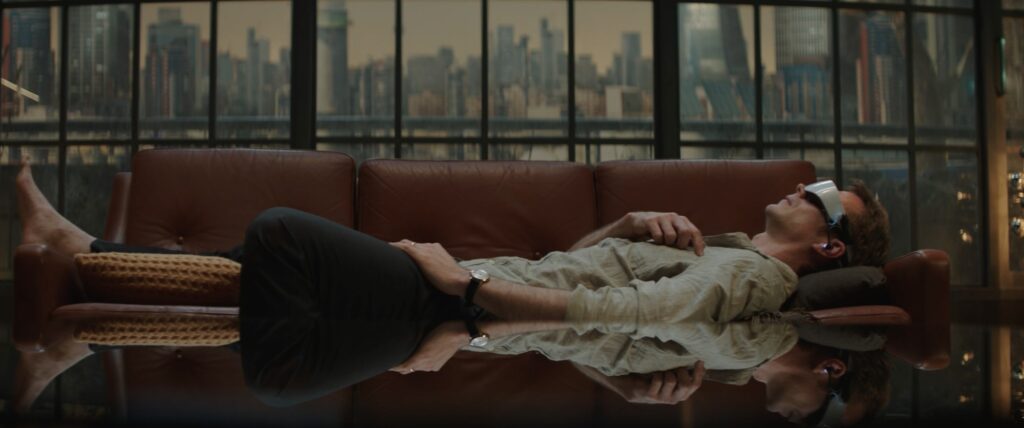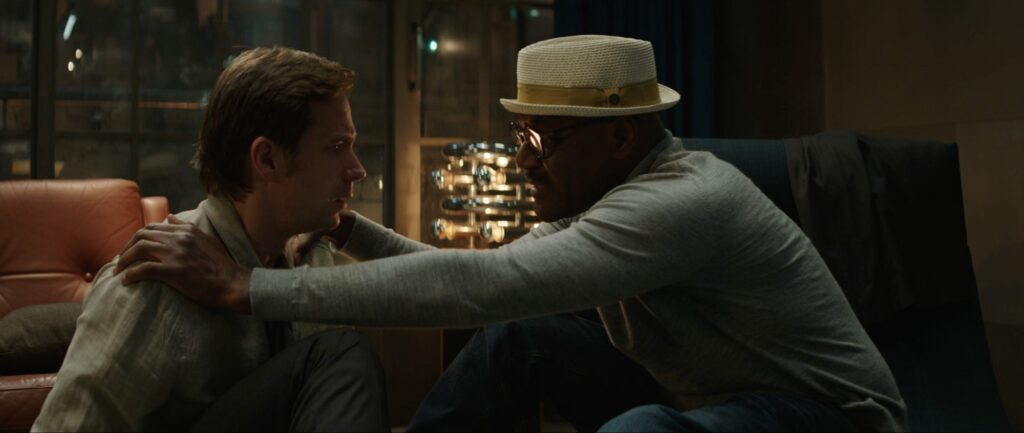Guy Moshe’s sci-fi effort, LX 2048, tackles a whole host of remarkable and thought-provoking concepts. It’s therefore deeply disappointing that it explores these themes in the clunkiest and perhaps least interesting way possible.
The film is set in 2048, when the ozone layer is all but gone and people are now confined to their houses during daylight hours to avoid fatal sunburn. In this dystopian society, people have resorted to living their lives on a virtual platform known as ‘The Realm’. Work, school, socialising and even romance are all carried out online through virtual-reality headsets.

In this disturbingly familiar virtual society, James D’Arcy plays Adam Bird, a disillusioned tech worker who defies conventions and walks around in daylight, albeit in a hazmat suit. Despite working for a tech company that manufactures VR headsets, Adam deeply resents the influence that technology has had on society and advocates for a ‘real’ human life experience. Though he is willing to make an exception when it comes to fornication with a robotic sex doll.
While the rest of the population take daily antidepressants known as Lithium-X and have adapted to going about their lives at night, Adam refuses to conform and lives a life of unmedicated, daytime isolation. As though that weren’t enough material for a good story, writer-director Guy Moshe crowbars human clones in for good measure. These clones are immune to the sun’s rays and are therefore able to act as society’s workforce while the ‘real’ humans stay home on their upgraded Wii fits.

The film opens with one such clone-doctor telling Adam that his heart is failing and with no chance of a transplant (since accidents are a thing of the past) he will inevitably die. Luckily for Adam, since he has three children, he is eligible for ‘Premium Three’. In a time when birth rates have unsurprisingly declined, ‘Premium Three’ is an insurance policy that is available for parents of three or more children, whereby if one parent dies, a clone will be given to the family to help raise the offspring. Adam is not entirely thrilled with the prospect of being replaced by a clone and spends the rest of the film wrestling with his distrust of technology and his desire to help his family.
There are a lot of rich ideas at work here: anxiety towards an increasingly virtual world, commentary on climate change and the risk it poses to human life, the blurring of what we consider “real life”. Indeed, on paper, the film sounds like a promising, sharp commentary on society, following in the strides of the ever so impressive Black Mirror.

Moshe, however, transform what should be a stimulating and thought-provoking film into a clunky and awkward mess. James D’Arcy tries his absolute hardest to save LX 2048 but even his committed performance cannot rescue the film from its unbelievably wooden script and frankly ridiculous plotting. Moshe tackles so many ideas that he sets himself up with the impossible task of bringing the whole thing to term. Inevitably, he does not. By the end, Adam’s heart condition, which seemed to be the catalyst for the story, is completely forgotten. Instead, the final act devolves into nonsensical chaos and we are treated to a doppelganger duel, a Shakespearean duologue and the murder of a sex-doll. It is a complete disaster.
With so many plot threads at work, one cannot help but think that LX 2048 might have found better footing as a series. At least then it might have had the chance to tackle some of its most interesting concepts in more depth. It may have also benefitted from a few more rounds in the writers’ room. As a feature however, it lacks focus, coherence and any satisfying sense of plot.
Moshe’s ambition and vision deserve praise but sadly neither are realised in LX 2048.
Dazzler Media presents LX 2048 on Blu-ray, DVD & Digital Download January 25th.
